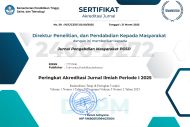Peningkatan Kesadaran dan Kewaspadaan Anak Sekolah dan Masyarakat dalam Pencegahan dan Penanggulangan COVID-19
Abstract
Community Service program is a mandatory program must be attended by students at several university including Universitas Pendidikan Indonesia. This activity should go to the villages directly, but because of Covid-19 the activities become online. This program used descriptive qualitative. This program started from November 16th until December 30th, 2020 with a demand time that must be taken is 120 hours. The program which was held by UPI during the Covid-19 pandemic carried the theme Thematic Community Service Lecture on the Prevention and Overcoming of the Impact of Covid-19. The program was held in Serang, Banten by online to prevent the spread of Covid-19. There are mandatory program and two optional programs in education and economic sectors. This program conducted a combination of strengthening student online learning, mentoring and parents during online schooling, helping school administration, making educational videos on programs to mitigate the impact of COVID-19 in the field of education which are shared on Instagram and Youtube, and making news articles published to mass media.
.
Keywords
Full Text:
PDFReferences
Adnan, M., Khan, S., Kazmi, A., Bashir, N., & Siddique, R. (2020). COVID-19 infection : Origin, transmission, and characteristics of human coronaviruses. Journal of Advanced Research, 24, 91–98. https://doi.org/10.1016/j.jare.2020.03.005
Baker, J. P., Goodboy, A. K., Bowman, N. D., & Wright, A. A. (2018). Does teaching with PowerPoint increase students’ learning? A meta-analysis. Computers & Education, 126, 376-387. https://doi.org/10.1016/j.compedu.2018.08.003
Barker, A., & Souisa, H. (2020). Coronavirus COVID-19 Death Rate In Indonesia Is The Highest In The World. Experts Say It’s Because Reported Case Numbers Are Too Low. https://www.abc.net.au/news/2020-03-23/why-is-indonesia-coronavirus-death-rate-highest-in-world/12079040
Basch, C. H., Hillyer, G. C., & Meleo-Erwin, Z. C. (2020). Preventive Behaviors Conveyed on YouTube to Mitigate Transmission of COVID-19. JMIR Public Health Surveill, 6(2), e18807
Beam, M. A., & Child, J. T. (2018). Context collapse and privacy management: Diversity in Facebook friends increases online news reading and sharing. New Media & Society, 20(7), 2296-2314. https://doi.org/10.1177/1461444817714790
Beiu, C., Mihai, M., Popa, L., Cima, L., & Popescu, M. N. (2020). Frequent Hand Washing for COVID-19 Prevention Can Cause Hand Dermatitis: Management Tips. Cureus, 12(4), e7506. https://doi.org/10.7759/cureus.7506
Bozkurt, A., Akgun-ozbek, E., Yilmazel, S., Erdogdu, E., Ucar, H., Guler, E., & Sezgin, S. (2015). Trends in Distance Education Research: A Content Analysis of Journals 2009-2013. International Review of Research in Open and Distributed Learning, 16(1), 330–363.
Chavez, S., Long, B., Koyfman, A., & Liang, S. Y. (2020). Coronavirus Disease (COVID-19): A primer for emergency physicians. American Journal of Emergency Medicine, (20), 178-179. https://doi.org/10.1016/j.ajem.2020.03.036
Churiyah, M., & Sakdiyyah, D. A. (2020). Indonesia Education Readiness Conducting Distance Learning in Covid-19 Pandemic Situation. International Journal of Multicultural and Multireligious Understanding, 7(6), 491–507.
Duggan, M. (2015). Mobile Messaging and Social Media 2015. Pew Center Research Group. http://www.pewinternet.org/2015/08/19/mobile-messaging-and-socialmedia-2015-main-findings/2015-08-19_social-media-update_a_03
Fatimah, C., & Ardiani, R. (2018). Pembuatan Hand Sanitizer (Pembersih Tangan Tanpa Air) Menggunakan Antiseptik Bahan Alami. Prosiding Seminar Nasional Hasil Pengabdian, 1(1), 336-346
Gonzalez, D. A., & Tortolero, L. (2020). Social Media Influence in the COVID-19 Pandemic. Int. braz j urol. 46(1), 120-124
Greenhalgh, T., Schmid, M. B., Czypionka, T., Bassler, D., & Gruer, L. (2020). Face masks for the public during the covid-19 crisis. BMJ, 369(1435): 1–4. https://doi.org/10.1136/bmj.m1435
Kurang, R. Y., Dollu, E. A., & Alelang, I. F. (2020). Pelatihan Pembuatan Hand Sanitizer Dari Bahan Alami di Desa Otvai. Jurnal Abdimas Bina Bangsa, 1(1), 137–142.
Lee, E., & Lee, J. (2015). Pictures Speak Louder than Words: Motivations for Using Instagram. Cyberpsychol Behav Soc Netw. 18(9), 552–556. https://doi.org/10.1089/cyber.2015.0157
Meri, Khusnul, Suhartati, R., Mardiana, U., & Nurpalah, R. (2020). Pemberdayaan Masyarakat Dalam Penggunaan Hand Sanitiser Dan Masker Sebagai Upaya Preventif Terhadap Covid- Bantenese: Jurnal Pengabdian Masyarakat, 2(1), 26–33.
Moleong, L. J. (2017). Metodologi Penelitian Kualitatif. Bandung: ROSDA.
Muzakki, F. (2020). The Global Political Economy Impact of COVID-19 and The Implication to Indonesia. Journal of Social Political Sciences, 1(2), 76–93.
Ogbonna, C. G., Ibezim, N. E., & Obi, C. A. (2019). Synchronous versus asynchronous e-learning in teaching word processing: An experimental approach. South African Journal of Education, 39(2), 1–15.
Pittman, M., & Reich, B. (2016). Social media and loneliness: Why an Instagram picture may be worth more than a thousand Twitter words. Computers in Human Behavior, 62, 155–167. https://doi.org/10.1016/j.chb.2016.03.084
Prawoto, N., Purnomo, E. P., & Zahra, A. A. (2020). The Impacts of COVID-19 Pandemic on Socio-Economic Mobility in Indonesia. International Journal of Economics and Business Administration, VIII(3), 57–71.
Rasmitadila, Aliyyah, R. R., Rachmadtullah, R., Samsudin, A., Riana, A., & Tambunan, S. (2020). The Perceptions of Primary School Teachers of Online Learning during the COVID-19 Pandemic Period : A Case Study in Indonesia. Journal of Ethnic and Cultural Studies, 7(2), 90–109.
Saharuddin, A. (2017). Peran Teknologi Pembelajaran Islam Dalam Organisasi Belajar. Edumaspul: Jurnal Pendidikan,1, 1–8.
Syaparuddin, & Elihami. (2020). Peningkatan Motivasi Belajar Siswa Melalui Video Pada Pembelajaran PKn Di Sekolah Paket C. Jurnal Edukasi Nonformal, 1(1), 187-200
Thelwall, M., & Vis, F. (2017). Gender and image sharing on Facebook, Twitter, Instagram, Snapchat and WhatsApp in the UK: Hobbying alone or filtering for friends? Aslib Journal of Information Management, 69(6), 702-720. https://doi.org/10.1108/AJIM-04-2017-0098.
UNESCO. (2020). COVID-19 Educational Disruption and Response. https://en.unesco.org/covid19/educationresponse
Yulianingsih, W., & Nugroho, R. (2021). Keterlibatan Orangtua dalam Pendampingan Belajar Anak selama Masa Pandemi Covid-19. Jurnal Obsesi: Jurnal Pendidikan Anak Usia Dini, 5(2), 1138–1150. https://doi.org/10.31004/obsesi.v5i2.740
Zukmadini, A. Y., Karyadi, B., & Kasrina. (2020). Edukasi Perilaku Hidup Bersih dan Sehat (PHBS) dalam Pencegahan COVID-19 Kepada Anak-Anak di Panti Asuhan. Jurnal Pengabdian Magister Pendidikan IPA, 3(1), 68-76. https://doi.org/10.29303/jpmpi.v3i1.440
DOI: https://doi.org/10.17509/jpm.v1i1.30826
Refbacks
- There are currently no refbacks.
Copyright (c) 2021 Iha Zakiyah

Jurnal Pengabdian Masyarakat PGSD is licensed under a Creative Commons Attribution 4.0 International License.
This journal is indexed by

.png)



1.png)

1.png)


1.png)